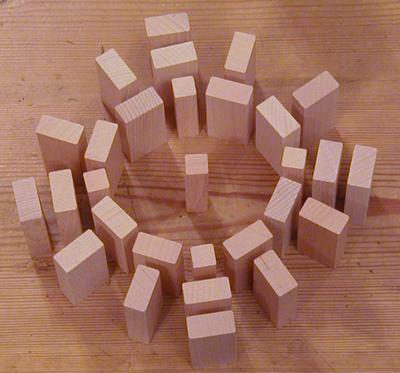 The blocks are the vocabulary, how they are placed, piled, built, is the syntax. Techniques that work become the block builders grammer. Block play becomes a means of nonverbal expression for the child (or disabled adult). Blockplay benefits from careful guidance and assistance in developing that grammer, but is most beneficial to the young child, and possibly to the disabled adults if freedom to express is left unconstrained. [See the outstanding Exploring Learning : Young Children and Blockplay
The blocks are the vocabulary, how they are placed, piled, built, is the syntax. Techniques that work become the block builders grammer. Block play becomes a means of nonverbal expression for the child (or disabled adult). Blockplay benefits from careful guidance and assistance in developing that grammer, but is most beneficial to the young child, and possibly to the disabled adults if freedom to express is left unconstrained. [See the outstanding Exploring Learning : Young Children and BlockplayMost of my block building at least begins with copying a published example. Is this a failure of originality, or more akin to reading aloud, or singing a favorite song? Early most mornings I sing a short song about my cat. It is the process of my daily recreation of my ability to speak. Afterwards, I am usually more able to interact verbally with my wife. Occasionally, I will read aloud from a page in a German book. Afterwards, my ability to speak German, or even to comfortably read silently, is clearly enhanced.
Doesn't it make sense that by building established patterns with blocks, I am exercising the grammar of block play, and thus exercising that nonverbal portion of the brain? Perhaps there would be benefits to more consistantly following up rote building with original building, even if not on the same scale.
It has become very clear that after a session of block play, copying or creative, I am much more able to communicate in writing, as this blog testifies, and verbally as well.




No comments:
Post a Comment